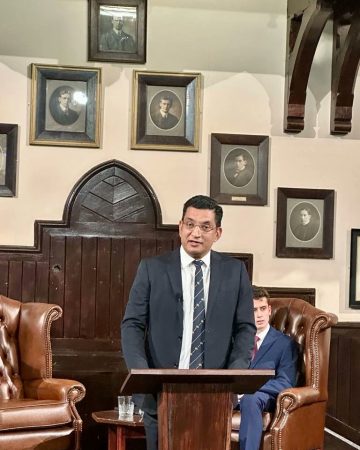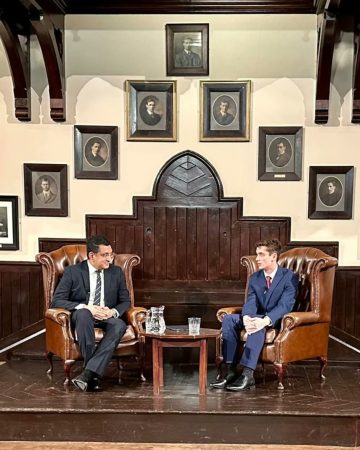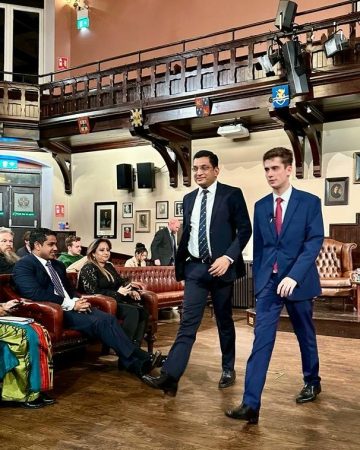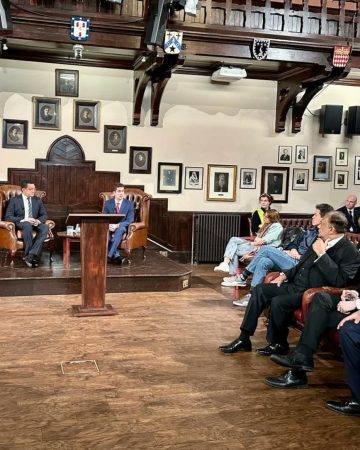
It is an honour to stand before this distinguished audience at the Cambridge Union today. Your Union invited me to share my insight as a lawyer and a lawmaker, and I am grateful for this opportunity to address you all.
I come from Sri Lanka, which, due to its strategic location at the intersection of maritime trade routes and sea lanes, has historically attracted the interest of global superpowers. Prior to gaining independence in 1948, Sri Lanka was under colonial rule for around 500 years. Though the colonial era’s legacy of exploitation and division left an indelible mark on our nation, we can’t disregard its positive contributions, such as introducing democracy, the rule of law, a strong independent judiciary, a robust civil service, and essential infrastructure.
At the threshold of independence, it was up to the leaders of the diverse, multicultural, and newly independent Sri Lanka to build on those fundamentals and create a stable, peaceful, and prosperous nation for all its citizens. Democracy is undoubtedly the most desirable form of governance, yet, in my opinion, it has three major inherent challenges to overcome. Firstly, to desist from the temptation to exploit societal differences for electoral gains. Secondly, to resist unsustainable populist economic policies in furtherance of vote bank politics. Finally, there is the challenge of maintaining basic policy consistency across government and party lines.
The relative economic and social progress that democracies have achieved globally can be directly attributed to how well the leaders within those countries tackled these three challenges.
Looking back at the last 75 years, as an independent nation, Sri Lanka has worked diligently to ensure the social upliftment of its people. We have addressed the challenges of literacy, nutrition, education, and social welfare, achieving significant progress in these areas. Sri Lanka provides univeresal free healthcare and free education to all its citizens. Since universal adult franchise was conferred on Sri Lanka in 1931, we have consistently maintained peaceful transfer of power, separation of powers, and an independent judiciary to safeguard the rule of law.
While we take pride in our achievements, we must also have the humility to accept our failures. We are still a work in progress when considering our most critical aim: forging together the diversity of our people into one coherent and strong Sri Lankan nation. We have faltered along the way in the last 75 years. We have permitted our differences to gain prominence and dominate the social fabric, subsequently failing to nurture the commonalities that bind us together.
Sri Lanka has a vibrant and independent judiciary, but much cannot be said of its efficacy and efficiency. As a citizen and lawyer, I have been constantly troubled by the perennial issue of law delays, which have plagued the efficient and equitable administration of justice. A routine lack of investment in the legal system, the failure to regularly review and revisit old laws, and the reluctance to embrace technology have been its root causes.
For example, by 2019, Sri Lanka had approximately 1 million cases to be heard by 336 judges in all courts. When divided by the population, this works out to 15 judges for every 1 million citizens, whereas advanced jurisdictions have a ratio ranging from 40 to 150 judges per million citizens.
As the saying goes, justice delayed is justice denied. Law’s delays have a direct negative impact on the rule of law, social cohesion, investment, and the economic advancement of a nation.
“My country, right or wrong; if right, to be kept right; and if wrong, to be set right."
Even though some people find this saying to be controversial, its inner meaning— emphasizing the responsibility of a citizen in nation-building—has always inspired me.
I was invited to take over the Ministry of Justice, and although politics was not my cup of tea, I saw this as an opportunity to actively overhaul the systems I had been limited to critiquing from the sidelines.
When I took over as Minister of Justice, I realised the solution needed to be holistic. I focused on five specific areas:
- Securing sufficient funds for the justice sector
- Improving the infrastructure of the legal system
- Embracing technology, particularly digitization
- Increasing the number of judges
- Reform of the law covering the areas of criminal law reform, civil law reform, and commercial law reform
In a relatively short period of time, our initiatives resulted in significant success, entailing an increase in the number of judges in courthouses, the introduction of online hearings, and the commencement of the process of amending and introducing over a hundred laws.
In early 2022, while our focus was on judicial reforms, Sri Lanka was facing the worst economic crisis since its independence, and it threatened to completely unravel the nation.
Years of unsustainable populist policies, the accumulation of severe debt burdens, a refusal to make rational and prudent economic decisions, and a lack of political will to meaningfully combat the menace of corruption made this inevitable. External shocks such as COVID-19 and the war in Ukraine hastened the process.
Amidst the rapid depreciation of the rupee, inflation was skyrocketing. Forex shortages curbed the importation of essentials. Long queues for cooking gas and fuel, together with long hours of power cuts never seen in recent history, brought the Sri Lankan public to their knees. They were outraged, and rightly so. Demonstrations and agitations against the government became an almost daily occurrence, and growing tensions reached a breaking point.
The resulting chaos compelled me to change course and take over the Ministry of Finance. There were no takers for this unenviable job, but I did not want to abandon my country at one of its most decisive moments in history.
In addressing Parliament, I decided to take a different strategy. I told the public the uncomfortable truth about our economy, referring to shocking statistical data to highlight Sri Lanka’s deeply troubling financial position. We decided to replace crucial decision- making bureaucrats with technocrats committed to the reform process. We commenced critical negotiations with the IMF, the World Bank, and other multilateral development banks. We initiated the debt restructuring process to attain debt sustainability and advocated for and introduced cost-reflective pricing to ensure an unimpeded supply of essential items.
As unlocking the IMF’s extended fund facility was not immediate, the challenge was to secure bridge financing in order to ensure the economy did not collapse beyond repair. The repurposing of the funds from multilaterals and the support extended by the government of India at that crucial hour provided us with a lifeline.
While the reforms were taking shape, the public was in no mood to compromise. Continuous agitation and uprisings by the public resulted in President Gotabaya Rajapakse relinquishing office. The subsequent constitutional process led to President Ranil Wickremesinghe succeeding in his place.
President Wickremasinghe, a seasoned politician with wide-ranging experience, swiftly took control of the situation and adopted a dual strategy. The restoration of law and order and crucial economic reforms were pursued with renewed vigour and purpose.
Upon assuming office, President Ranil Wickremesinghe tasked me with taking over the Ministry of Foreign Affairs in order to navigate Sri Lanka’s foreign policy through the tumultuous waters of global power rivalry. This was put to the test due to Sri Lanka’s intricate debt restructuring process, which required assurances from multiple major powers.
As an emerging economy, we pursued an independent foreign policy strategy, reaching out to a diverse spectrum of international allies in both the east and the west.
The Western-based Paris Club, which includes Japan, India, and China, constantly supported our effort to secure an extended fund facility with the IMF as well as our debt restructuring process required to attain debt sustainability.
We believe our independent yet multi-aligned foreign policy has helped us navigate these difficult challenges and obtain the support of the larger international community.
18 months later, Sri Lanka’s inflation, which was 70% in September 2022, has come down to less than 5% in August 2023. The rupee had stabilised and, in fact, appreciated by about 15% from its peak against the US dollar. Remittances have seen a 60% annual growth in 2023. Tourism has in fact seen an annual growth of 106% in the year 2023; usable forex reserves, which were at 20 million US dollars in April 2022, have gone up to 4.5 billion US dollars in January 2024.
We are not out of the woods yet, but Sri Lankans have shown tremendous resilience in weathering this very challenging period. If we successfully resist divisive policies and embrace the unity within our diversity, if we continue these difficult yet prudent economic policy reforms, and if we maintain policy consistency across government and political party lines, I honestly believe Sri Lanka is within touching distance of achieving its true potential.
Let me conclude with the following quote:
A stone is broken by the last stroke of a hammer. This doesn't mean that the first stroke is useless. Success is the result of continuous and persistent efforts.
I sincerely wish that my contribution could make a small dent in the profound debt of gratitude that I owe my country.



..............................
2024 ජනවාරි 23 වැනි දින කේම්බ්රිජ් විශ්වවිද්යාලයීය ශිෂ්ය සංගමය අමතා විදේශ කටයුතු අමාත්ය අලි සබ්රි මහතා විසින් පවත්වනු ලැබූ දේශනය
අද දින කේම්බ්රිජ් විශ්වවිද්යාලයීය ශිෂ්ය සංගමයේ මෙම සම්භාවනීය ප්රේක්ෂකයින් ඉදිරියේ පෙනී සිටීමට ලැබීම මම ගෞරවයක් ලෙස සලකමි. නීතිඥයකු සහ නීති සම්පාදකයකු ලෙස මගේ අදහස් බෙදා ගැනීම සඳහා ඔබ සංගමය විසින් මට ආරාධනා කරන ලද අතර ඔබ සැම ඇමතීමට අවස්ථාවක් සැලසීම පිළිබඳව මම කෘතඥ වෙමි.
මා නියෝජනය කරන්නේ සමුද්රීය වෙළෙඳ මාර්ග සහ මුහුදු මාර්ග අන්තර්ඡේදනය වන ස්ථානයක උපායමාර්ගික පිහිටීම හේතුවෙන් ඓතිහාසිකව ගෝලීය සුපිරි බලවතුන්ගේ ආකර්ෂණයට ලක් වී ඇති ශ්රී ලංකාවයි. 1948 නිදහස ලබා ගැනීමට පෙර ශ්රී ලංකාව වසර 500 ක් පමණ යටත් විජිත පාලනය යටතේ පැවතිණි. යටත් විජිත යුගයේ සූරාකෑම් සහ බෙදීම් අපේ ජාතිය මත නොමැකෙන සලකුණක් තැබුවද, ප්රජාතන්ත්රවාදය, පාලන නීතී, ශක්තිමත් ස්වාධීන අධිකරණයක්, ශක්තිමත් සිවිල් සේවයක් හඳුන්වාදීම සහ අත්යවශ්ය යටිතල පහසුකම් ඇති කිරීම වැනි එහි ධනාත්මක දායකත්ව අපට නොසලකා හැරිය නොහැකිය.
නිදහස ආරම්භයේදී, විවිධත්වයෙන් යුත්, බහුසංස්කෘතික සහ අලුතෙන් නිදහස ලැබූ ශ්රී ලංකාවේ නායකයන්ට එකී මූලිකාංග මත පදනම් වමින් රටේ සියලු පුරවැසියන් සඳහා ස්ථාවර, සාමකාමී සහ සමෘද්ධිමත් ජාතියක් නිර්මාණය කිරීමේ කාර්යය භාර විය. ප්රජාතන්ත්රවාදය යනු නිසැකව ම පාලනයේ වඩාත්ම යෝග්ය ස්වරූපය වන මුත්, මගේ මතය අනුව, එයට ජයගත යුතු ප්රධාන නෛසර්ගික අභියෝග තුනක් ඇත. පළමුව, මැතිවරණ වාසි වෙනුවෙන් සමාජ විසමතාවලින් අයුතු ප්රයෝජන ලැබීමේ පෙළඹවීමෙන් වැළකී සිටීම. දෙවැනුව, ඡන්ද බැංකු දේශපාලනය ඉදිරියට ගෙන යෑම පිණිස පවතින්නා වූ තිරසර නොවන ජනප්රිය ආර්ථික ප්රතිපත්තිවලට ප්රතිරෝධය දැක්වීම. අවසාන වශයෙන්, රජයේ සහ පක්ෂයේ මතවාද පරයමින් මූලික ප්රතිපත්ති අනුකූලතාව පවත්වා ගැනීමේ අභියෝගය ඒවායි.
ප්රජාතන්ත්රවාදී රටවල් ගෝලීය වශයෙන් අත්කර ගෙන ඇති සාපේක්ෂ ආර්ථික හා සමාජ ප්රගතියේ හේතුව වශයෙන් ඍජුවම දැක්විය හැක්කේ එම රටවල්වල නායකයන් මෙම අභියෝග ත්රිත්වයට මුහුණ දුන් ප්රශස්ත ආකාරයයි.
පසුගිය වසර 75 දෙස ආපසු හැරී බලන විට, ස්වාධීන රාජ්යයක් ලෙස, ශ්රී ලංකාව සිය ජනතාවගේ සමාජ උන්නතිය සහතික කිරීම සඳහා කැපවීමෙන් කටයුතු කර ඇත. අපි සාක්ෂරතාව, පෝෂණය, අධ්යාපනය සහ සමාජ සුබසාධනය යන අභියෝගවලට මුහුණ දෙමින් මෙම ක්ෂේත්රවල සැලකිය යුතු ප්රගතියක් අත්කර ගෙන ඇත්තෙමු. ශ්රී ලංකාව සිය සියලුම පුරවැසියන්ට නිදහස් සෞඛ්ය සේවාවක් සහ නොමිලේ අධ්යාපනය ලබා දෙයි. 1931 දී සර්වජන ඡන්ද බලය ශ්රී ලංකාවට ප්රදානය කරන ලද තැන් පටන් නීතියේ ආධිපත්යය ආරක්ෂා කිරීම සඳහා අපි සාමකාමී බලය පැවරීම, බලතල බෙදීම සහ ස්වාධීන අධිකරණයක් පවත්වා ගෙන යෑම තිර ලෙස කළෙමු.
අප අපගේ ජයග්රහණ පිළිබඳව ආඩම්බර වන අතරම, අපගේ අසමත්කම් පිළිගැනීමේ නිහතමානීකමද අප සතුව තිබිය යුතුමය. අපගේ වඩාත්ම තීරණාත්මක අරමුණ, එනම්, අපගේ ජනතාවගේ විවිධත්වය එක් සුසංයෝගී සහ ශක්තිමත් ශ්රී ලාංකික ජාතියක් බවට පත් කිරීම පිළිබඳ සලකා බලන විට අපි ඒ සඳහා තවමත් කටයුතු කරමින් සිටින්නෙමු. පහුගිය අවුරුදු 75ක කාලය තුළ අපි ඒ අරමුණ කරා ළඟා වීමට අසමත් වී සිටිමු. අප අපගේ මතභේදවලට ප්රමුඛත්වය ලබා ගැනීමට සහ සමාජ දේහය මත සිය ආධිපත්යය පැතිරවීමට ඉඩ දී ඇති අතර, එහි ප්රතිඵලයක් ලෙස අප එකට බැඳ තබන පොදු ලක්ෂණ පෝෂණය කිරීමට අපොහොසත් වූයෙමු.
ශ්රී ලංකාව තුළ ශක්තිමත් සහ ස්වාධීන අධිකරණයක් තිබේ. එහෙත් එහි සඑලතාව සහ කාර්යක්ෂමතාව ගැන කීමට එතරම් දෙයක් නැත. පුරවැසියකු සහ නීතීඥයකු වශයෙන්, යුක්තිය පසිඳලීමේ කාර්යක්ෂම සහ සාධාරණ පරිපාලනය පීඩාවට පත් කර ඇති, නීතියෙහි ප්රමාදය පිළිබඳ සදාකාලික ප්රශ්නයෙන් මම නිරන්තරයෙන් පීඩාවට පත් වී සිටිමි.
නීති පද්ධතිය තුළ නිතිපතා ආයෝජන හිඟකම, පැරැණි නීති නිතිපතා සමාලෝචනය කිරීමට සහ නැවත පරීක්ෂා කර බැලීමට අසමත් වීම සහ තාක්ෂණය වැලඳ ගැනීමට ඇති අකමැත්ත එහි මූලික හේතු වී ඇත.
නිදසුනක් වශයෙන්, 2019 වන විට, ශ්රී ලංකාවේ සියලුම අධිකරණවල විනිසුරුවරුන් 336 දෙනකු විසින් විභාග කරනු ලැබීමට ආසන්න වශයෙන් නඩු මිලියනයක් තිබිණි. ජනගහනයෙන් බෙදූ විට, මෙය සෑම පුරවැසියන් මිලියනයක් සඳහාම විනිසුරුවන් 15 දෙනෙකි. එහෙත් දියුණු අධිකරණ බල ප්රදේශවල පුරවැසියන් මිලියනයකට විනිසුරුවරුන් 40 සිට 150 දක්වා අනුපාතයක් ඇත.
ප්රමාද වූ යුක්තිය වනාහී යුක්තිය ලබා නොදීමයැයි කියමනක් තිබේ. නීතියේ ඇති ප්රමාද, නීතියේ ආධිපත්යය, සමාජ ඒකාබද්ධතාව, ආයෝජනය සහ ජාතියක ආර්ථික අභිවෘද්ධිය කෙරෙහි සෘජු ඍණාත්මක බලපෑමක් ඇති කරයි.
“හරි හෝ වැරදි ඒ මගේ රටයි; එය නිවැරැදි නම් නිවැරදිව තබා ගත යුතුය; වැරැදි නම් නිවැරැදි කළ යුතුය."
ඇතැමුන් මෙම කියමන විවාදාපන්න එකක් ලෙස දකිතත්, එහි අභ්යන්තර අර්ථය මා හට සැමවිටම අනුප්රාණය සපයා තිබේ. ජාතිය ගොඩනැඟීමේ දී පුරවැසියකු සතු වගකීම ඉන් අවධාරණය කරන බැවිනි.
අධිකරණ අමාත්යාංශය භාර ගන්නා ලෙස මට ඇරයුම් කෙරිණි. දේශපාලනය වනාහී මගේ රුචිකත්වයෙන් බැහැර වූ යමක් වූවද බැහැර සිට විවේචනය කිරීමට පමණක් මට සීමා පැනවී තිබූ පද්ධතීන් සක්රීයව ප්රතිසංස්කරණය කිරීමට ලැබුණු අවස්ථාවක් ලෙස මම මෙය දුටුවෙමි.
මා අධිකරණ අමාත්යවරයා ලෙස වැඩ භාරගත් විට විසැඳුම සාකල්ය විය යුතු බව මට වැටහිණි. එබැවින් මා කළේ විශේෂිත ක්ෂේත්ර පහක් කෙරෙහි අවධානය යොමු කිරීමයි:
- අධිකරණ ක්ෂේත්රය සඳහා ප්රමාණවත් අරමුදල් සුරක්ෂිත කිරීම
- නීති පද්ධතියේ යටිතල පහසුකම් වැඩිදියුණු කිරීම
- තාක්ෂණය, විශේෂයෙන්ම ඩිජිටල්කරණය වැලඳ ගැනීම
- විනිසුරුවන් සංඛ්යාව වැඩි කිරීම
- අපරාධ නීති ප්රතිසංස්කරණ, සිවිල් නීති ප්රතිසංස්කරණ, සහ වාණිජ නීති ප්රතිසංස්කරණය
සාපේක්ෂ වශයෙන් කෙටි කාලයක් තුළ, අපගේ මුලපිරීම් සැලකිය යුතු සාර්ථකත්වයක් අත්කර ගත් අතර, උසාවිවල විනිසුරුවරුන් සංඛ්යාව වැඩිවීම, මාර්ගගත නඩු විභාග හඳුන්වාදීම සහ නීති සියයකට වඩා සංශෝධනය කර හඳුන්වාදීමේ ක්රියාවලිය ආරම්භ කිරීම ඊට ඇතුළත් විය.
2022 වසර මුල් භාගයේදී, අධිකරණ ප්රතිසංස්කරණ කෙරෙහි අපගේ අවධානය යොමුවී තිබෙන අතරතුර, නිදහස ලැබීමෙන් පසු ශ්රී ලංකාව මුහුණ දුන් දරුණුතම ආර්ථික අර්බුදයට එය මුහුණපාමින් සිටියේය. එම අර්බුදය ජාතිය මුළුමනින්ම අවුල් කර දැමීමට තර්ජනය කළේය.
වසර ගණනාවක් තිස්සේ පවත්වා ගැනුණු තිරසර නොවන ජනප්රිය ප්රතිපත්ති, දැඩි ණය බර සමුච්චය වීම, තාර්කික හා විචක්ෂණශීලී ආර්ථික තීරණ ගැනීම ප්රතික්ෂේප කිරීම සහ දූෂණ උවදුර සමඟ අර්ථවත් ලෙස සටන් කිරීමට දේශපාලන අධිෂ්ඨානය නොමැතිකම මෙම තත්ත්වය නොවැළැක්විය හැකි එකක් බවට පත් කොට තිබිණි. කොවිඩ්-19 සහ යුක්රේන යුද්ධය වැනි බාහිර කම්පන විසින් මෙම ක්රියාවලිය තවත් වේගවත් කරනු ලැබුණේය.
රුපියල ශීඝ්ර ලෙස අවප්රමාණය වීම මධ්යයේ උද්ධමනය අහස උසට නැඟෙමින් තිබිණි.විදේශ විනිමය හිඟය අත්යවශ්ය ද්රව්ය ආනයනය සීමා කළේය. ගෑස් සහ ඉන්ධන සඳහා වූ දිගු පෝලිම්, මෑත ඉතිහාසයේ කිසි දිනෙක නොදුටු දීර්ඝ පැය ගණනක් පුරා වූ විදුලිය විසන්ධි කිරීම් ශ්රී ලාංකීය මහජනතාව දැඩි පීඩනයකට ලක් කිරීමට හේතු විය. ඔවුන් කෝපයට පත් වූ අතර එය එසේ වීම සාධාරණ විය.ආණ්ඩුවට එරෙහි පෙළපාලි සහ උද්ඝෝෂණ දිනපතා සිදුවන දෙයක් බවට පත් වූ අතර, වර්ධනය වන ආතතීන් බිඳවැටීමේ ලක්ෂ්යයකට ළඟා විය.
එහි ප්රතිඵලයක් ලෙස ඇති වූ ව්යාකූලත්වය මට මගේ ගමන වෙනස් කොට මුදල් අමාත්යාංශය භාර ගැනීමට බල කළේය. මෙම දුෂ්කර කාර්යය ඉටු කිරීම සඳහා භාර ගන්නන් සිටියේ නැත. එහෙත්, ඉතිහාසයේ වඩාත්ම තීරණාත්මක මොහොතක මගේ රට අත්හැරීමට මට අවශ්ය නොවීය.
පාර්ලිමේන්තුව අමතමින්, මම වෙනස් උපාය මාර්ගයක් යොදාගැනීමට තීරණය කළෙමි. ශ්රී ලංකාවේ අතිශය දරුණු මූල්ය තත්ත්වය හුවා දැක්වීමට කම්පනය ඇති කරනසුලු සංඛ්යාලේඛන සහ දත්ත උපුටා දක්වමින් මම අපේ ආර්ථිකය පිළිබඳ අමිහිරි සත්යය මහජනතාවට පැවසූයෙමි. තීරණාත්මක තීරණ ගත යුතු නිලධාරීන් වෙනුවට ප්රතිසංස්කරණ ක්රියාවලියට කැපවී සිටින තාක්ෂණවේදීන් ආදේශ කිරීමට අපි තීරණය කළෙමු. අපි ජාත්යන්තර මූල්ය අරමුදල, ලෝක බැංකුව සහ අනෙකුත් බහුපාර්ශ්වික සංවර්ධන බැංකු සමඟ තීරණාත්මක සාකච්ඡා ආරම්භ කළෙමු. අප ණය තිරසරභාවය ලබා ගැනීම සඳහා ණය ප්රතිව්යුහගත කිරීමේ ක්රියාවලිය ආරම්භ කළ අතර අත්යවශ්ය භාණ්ඩ බාධාවකින් තොරව සැපයීම සහතික කිරීම සඳහා පිරිවැය පරාවර්තක මිලකරණය හඳුන්වා දුනිමු.
ජාත්යන්තර මූල්ය අරමුදලේ විස්තීර්ණ අරමුදල් පහසුකම ලබා ගැනීම ක්ෂණිකව සිදු නොවූ බැවින් ආර්ථිකය අලුත්වැඩියා කළ නොහැකි ලෙස කඩා නොවැටීම සහතික කිරීම පිණිස සේතු මූල්යකරණය සුරක්ෂිත කිරීම අපගේ අභියෝගය විය. බහුපාර්ශ්වික අරමුදල් යළි වෙනත් අරමුණු වෙනුවෙන් යෙදවීමත් එම තීරණාත්මක අවස්ථාවේදී ඉන්දියානු රජය ලබා දුන් සහයෝගයත් අපට නව ජීවයක් ලබා දුන්නේය.
ප්රතිසංස්කරණ හැඩගැසෙමින් තිබියදී මහජනතාව කිසිදු සම්මුතියකට නොපැමිණියේය. මහජනතාවගේ අඛණ්ඩ උද්ඝෝෂණ සහ නැගිටීම්වල ප්රතිඵලයක් ලෙස ජනාධිපති ගෝඨාභය රාජපක්ෂ මහතා සිය ධුරයෙන් ඉවත් විය. ඉන් පසුව ඇති වූ ව්යවස්ථා සම්පාදන ක්රියාවලිය මගින් රනිල් වික්රමසිංහ මහතා ජනාධිපතිවරයා ලෙස පත් වූයේය.
පළපුරුදු අත්දැකීම් ඇති දේශපාලනඥයකු වූ ජනාධිපති වික්රමසිංහ මහතා ඉතා ඉක්මනින් තත්ත්වය පාලනය කර ද්විත්ව උපාය මාර්ගයක් අනුගමනය කළේය. නීතිය හා සාමය යථා තත්ත්වයට පත් කිරීම සහ තීරණාත්මක ආර්ථික ප්රතිසංස්කරණ නව ජවයකින් සහ අරමුණකින් යුතුව ක්රියාත්මක විය.
ජනාධිපති රනිල් වික්රමසිංහ මහතා බලයට පත්වීමෙන් පසු, ගෝලීය බල එදිරිවාදිකම්වල කැලඹිලි සහිත ව්යාකූලතාවන් හරහා ශ්රී ලංකාවේ විදේශ ප්රතිපත්තිය ක්රියාත්මක කිරීම සඳහා ඒ මහතා විදේශ කටයුතු අමාත්යාංශය මට භාර දුන්නේය. බහුවිධ බලවතුන්ගේ සහතික අවශ්ය වූ ශ්රී ලංකාවේ සංකීර්ණ ණය ප්රතිව්යුහගත කිරීමේ ක්රියාවලිය හේතුවෙන් මෙය පරීක්ෂණයට ලක් විණි.
නැඟී එන ආර්ථිකයක් ලෙස, ස්වාධීන විදේශ ප්රතිපත්ති උපාය මාර්ගයක් අනුගමනය කළ අපි පෙරදිග සහ අපරදිග යන දෙදිගම සිටින ජාත්යන්තර සහචරයින්ගේ ප්රේක්ෂාවලියක් වෙත ළඟා වූයෙමු.
ජපානය ඇතුළත් බටහිර පදනමක් සහිත පැරිස් සමාජය, ඉන්දියාව සහ චීනය ජාත්යන්තර මූල්ය අරමුදල සමඟ විස්තීරණ අරමුදල් පහසුකමක් ලබා ගැනීමේ අපගේ උත්සාහයට මෙන්ම ණය තිරසරභාවය ලබා ගැනීමට අවශ්ය අපගේ ණය ප්රතිව්යුහගත කිරීමේ ක්රියාවලියට නිරන්තරයෙන් සහය විය.
අපගේ ස්වාධීන මුත් බහු-බැඳියාවෙන් යුත් විදේශ ප්රතිපත්තිය මෙම දුෂ්කර අභියෝගවලට මුහුණ දීමට සහ විශාලතර ජාත්යන්තර ප්රජාවේ සහය ලබා ගැනීමට අපට උපකාර කොට ඇති බව අපි විශ්වාස කරමු.
මාස 18කට පසුව, 2022 සැප්තැම්බර් මාසයේදී 70% ක් වූ ශ්රී ලංකාවේ උද්ධමනය 2023 අගෝස්තු මාසයේදී 5%ට වඩා අඩු මට්ටමකට පහත වැටී තිබේ. සත්ය වශයෙන්ම, රුපියල ස්ථාවර වී, එක්සත් ජනපද ඩොලරයට සාපේක්ෂව එහි උපරිමයේ සිට 15% කින් පමණ ඉහළ ගොස් ඇත. 2023 දී ප්රේෂණවල 60% ක වාර්ෂික වර්ධනයක් තිබේ. සංචාරක ව්යාපාරය 2023 වර්ෂයේදී 106% ක වාර්ෂික වර්ධනයක් පෙන්නුම් කළේය. 2022 අප්රේල් මාසයේදී ඇමෙරිකානු ඩොලර් මිලියන 20ක් වූ භාවිත කළ හැකි විදේශ විනිමය සංචිත 2024 ජනවාරි මාසයේදී ඇමෙරිකානු ඩොලර් බිලියන 4.5 දක්වා ඉහළ ගොස් ඇත.
අප තවමත් අර්බුදකාරී තත්වයෙන් මිදී නැත. එහෙත්, ශ්රී ලාංකිකයන් මෙම ඉතා අභියෝගාත්මක කාලපරිච්ඡේදය තුළ ඉමහත් ඔරොත්තු දීමේ හැකියාවක් පෙන්නුම් කර තිබේ. අප භේදකාරී ප්රතිපත්තිවලට සාර්ථකව ප්රතිරෝධය දක්වන්නේ නම් සහ අපගේ විවිධත්වය තුළ එකමුතුකම වැලඳ ගන්නේ නම්, මෙම දුෂ්කර එහෙත් විචක්ෂණශීලී ආර්ථික ප්රතිපත්ති ප්රතිසංස්කරණ ඉදිරියට ගෙන යන්නේ නම් සහ රජය සහ දේශපාලන පක්ෂ සීමාවන් පරයා ප්රතිපත්තිමය අනුකූලතාවක් පවත්වා ගන්නේ නම්, ශ්රී ලංකාවට එහි සැබෑ විභවය සාක්ෂාත් කර ගත හැකි බව මම අවංකවම විශ්වාස කරමි.
පහත උපුටනයෙන් මගේ දේශනය අවසන් කිරීමට කැමැත්තෙමි:
“මිටියක අවසන් පහරින් ගලක් කැඩී බිඳී යයි. මෙයින් අදහස් කරන්නේ පළමු පහරෙන් පලක් නැති බව නොවේ. සාර්ථකත්වය යනු අඛණ්ඩ හා නොපසුබට උත්සාහයේ ප්රතිඵලයකි”.
මගේ දායකත්වය, මා මගේ රටට ඇති කෘතඥතාවේ මහා ණයෙන් කුඩා ප්රමාණයක් හෝ ගෙවා දමනු ඇතැයි මම අවංකවම ප්රාර්ථනා කරමි.

